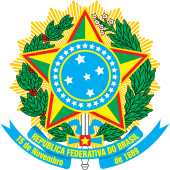| Constitution of the Federative Republic of Brazil Constituição da República Federativa do Brasil | |
|---|---|
 | |
| National Congress of Brazil | |
| Territorial extent | Brazil |
| Enacted by | 1988 Constituent Assembly |
| Commenced | 5 October 1988 |
| Status: Amended | |
Brazilian nationality law details the conditions by which a person is a national of Brazil. The primary law governing nationality requirements is the 1988 Constitution of Brazil, which came into force on 5 October 1988.
With few exceptions, almost all individuals born in the country are automatically citizens at birth. Foreign nationals may naturalize after meeting a minimum residence period (usually four years), demonstrating proficiency in the Portuguese language, and fulfilling a good character requirement.
Brazil was previously a colony and constituent kingdom of the Portuguese Empire, and local residents were Portuguese subjects. Although Brazil gained independence in 1822 and Brazilian nationals no longer hold Portuguese nationality, they continue to have favoured status when living in Portugal; Brazilians resident for at least three years are eligible to vote in Portuguese elections and serve in public office there.
Brazil is a member state of Mercosur, and all Brazilian nationals are Mercosur citizens. They have facilitated access to residence rights in all member states and most associated states of Mercosur.